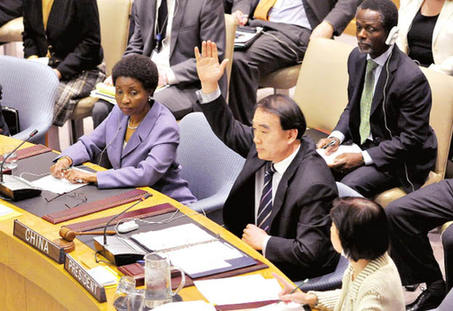China Must Participate in the Debate on World Order
By WU JIANMIN
World Order, the book authored by 91-year-old statesman Dr. Henry Kissinger, who served as Assistant to the President for National Security Affairs and later concurrently as Secretary of State in the administrations of Presidents Richard Nixon and Gerald Ford, and whose opinion was subsequently sought by five U.S. Presidents, sparked a global discussion upon its publication in 2014, one that merits China’s attention.
 |
|
China abstains from the UN Security Council vote on a no-fly zone over Libya on March 17, 2011. The picture shows Li Baodong, China’s permanent representative to the United Nations. |
My diplomatic career included 10 years, over the 1970s and 80s, in the U.S., during which time I became closely acquainted with Dr. Kissinger. On my recent visit to New York he invited chairwoman of the NPC Foreign Affairs Committee Fu Ying and me to lunch. On presenting me with a copy of his new book he reiterated his view that the China-U.S. relationship is the key to world order.
There have been three extensive debates on world order over the past 40 years. The focus of the first, at the sixth special session of the United Nations General Assembly, was on the problems of raw materials and development. Convened in 1974 at the request of Houari Boumediene, then chairman of both the Revolutionary Council of Algeria and the Non-Aligned Movement, the session received strong support from developing countries, and is a significant event in UN history. Deng Xiao-ping, who headed the Chinese delegation to the meeting, gave a speech elaborating China’s stance and views on establishing a new international economic order. As a member of China’s permanent mission to the UN, I was personally involved in the organization and convening of this meeting.
This special session was not unexpected, a series of incidents having set the stage for it. They began on October 6, 1973, with the breakout of the Arab-Israeli War. To express support for Egypt and Syria, the Arab oil-producing countries decided on October 17 to cut back on their production, and slapped embargos on oil exports to developed Western countries in protest at their assistance to Israel. Oil prices consequently soared from US $3.01 to US $11.65 a barrel in two months, so causing the worst economic turmoil in these countries since the end of WWII.
Imposing the sanctions taught developing countries a valuable lesson: that the raw materials and resources in their possession afforded them great power. Western countries dominated the world economic order in the 1970s, rigidly suppressing prices of raw materials and resources to serve their own interests at the cost of developing countries. State leaders and foreign ministers both debunked and rebuked this practice at the 1974 UN special session, arguing that Western colonialist deprivation, exploitation, and suppression were the root causes of poverty in the developing world. While witnessing the debate my impression was that of a third world indictment against colonialism. The meeting was heated and successful. Upon its conclusion the Declaration on the Establishment of a New International Economic Order and Program of Action on the Establishment of a New International Economic Order were adopted.
The sixth special session of the United Nations General Assembly constituted developing countries’ onslaught on the post-WWII world economic order. But its impact was limited due to the relative sparseness among the world total of developing economies. It therefore jolted the existing world economic order, but not to an extent that effected any great change.
The second famous debate on the world order occurred in the late 1980s and early 1990s, when the end of the Cold War created profound changes in the international situation, which, as Deng Xiaoping predicted, led to shifts in the world order.
- Answers to Four Key Questions about China’s Rise
- In Memory of Massacre Victims
- Mutual Understanding Is the Foundation of Sino-Danish Cooperation – An Interview with Danish Minister for Culture Marianne Jelved
- Difficulties, Solutions, and Hope
- Building a New Model of Major-Country Relationship – An Interview with Orville Schell
